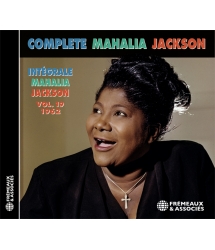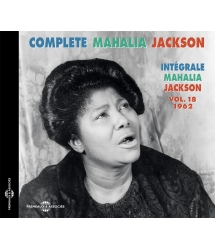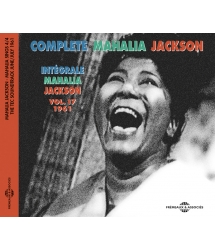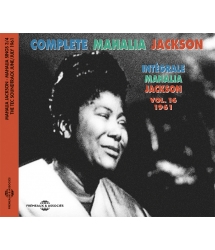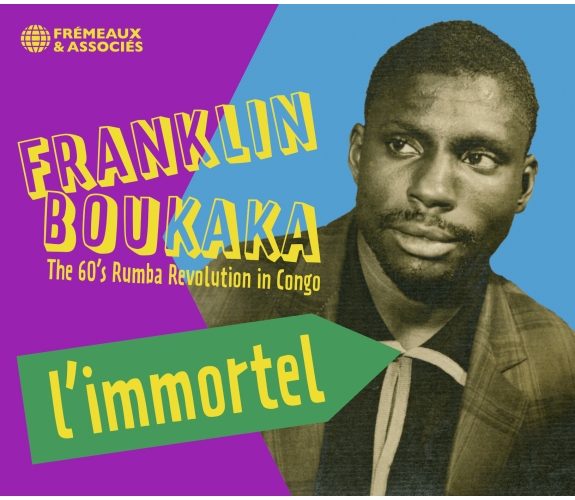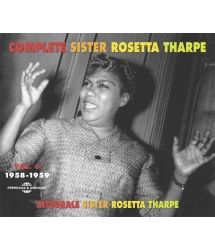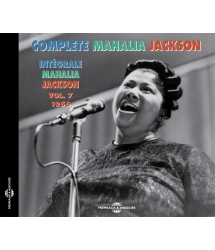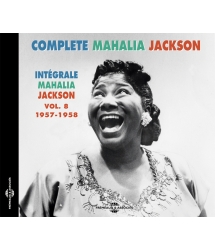- Notre Catalogue
- Philosophie
- Philosophes du XXème siècle et d'aujourd'hui
- Histoire de la philosophie (PUF)
- Contre-Histoire et Brève encyclopédie par Michel Onfray
- L'œuvre philosophique expliquée par Luc Ferry
- La pensée antique
- Les penseurs d'hier vus par les philosophes d'aujourd'hui
- Textes philosophiques historiques interprétés par de grands comédiens
- Histoire
- Livres
- Sciences Humaines
- Paroles historiques
- Livres audio & Littérature
- Notre Catalogue
- Jazz
- Blues - R'n'B - Soul - Gospel
- Rock - Country - Cajun
- Chanson française
- Musiques du monde
- Afrique
- France
- Québec / Canada
- Hawaï
- Antilles
- Caraïbes
- Cuba & Afro-cubain
- Mexique
- Amérique du Sud
- Tango
- Brésil
- Tzigane / Gypsy
- Fado / Portugal
- Flamenco / Espagne
- Yiddish / Israël
- Chine
- Tibet / Népal
- Asie
- Océan indien / Madagascar
- Japon
- Indonésie
- Océanie
- Inde
- Bangladesh
- URSS / Chants communistes
- Musiques du monde / Divers
- Musique classique
- Compositeurs - Musiques de film - B.O.
- Sons de la nature
- Notre Catalogue
- Jeunesse
- Philosophie
- Nouveautés
- Comment commander ?
- Recevoir le catalogue
- Manifeste
- Dictionnaire
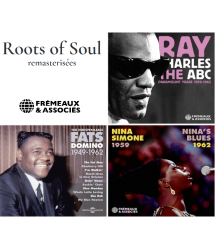

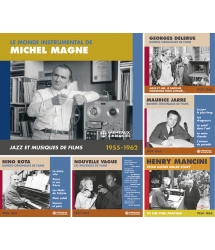








- Notre Catalogue
- Philosophie
- Philosophes du XXème siècle et d'aujourd'hui
- Histoire de la philosophie (PUF)
- Contre-Histoire et Brève encyclopédie par Michel Onfray
- L'œuvre philosophique expliquée par Luc Ferry
- La pensée antique
- Les penseurs d'hier vus par les philosophes d'aujourd'hui
- Textes philosophiques historiques interprétés par de grands comédiens
- Histoire
- Livres
- Sciences Humaines
- Paroles historiques
- Livres audio & Littérature
- Notre Catalogue
- Jazz
- Blues - R'n'B - Soul - Gospel
- Rock - Country - Cajun
- Chanson française
- Musiques du monde
- Afrique
- France
- Québec / Canada
- Hawaï
- Antilles
- Caraïbes
- Cuba & Afro-cubain
- Mexique
- Amérique du Sud
- Tango
- Brésil
- Tzigane / Gypsy
- Fado / Portugal
- Flamenco / Espagne
- Yiddish / Israël
- Chine
- Tibet / Népal
- Asie
- Océan indien / Madagascar
- Japon
- Indonésie
- Océanie
- Inde
- Bangladesh
- URSS / Chants communistes
- Musiques du monde / Divers
- Musique classique
- Compositeurs - Musiques de film - B.O.
- Sons de la nature
- Notre Catalogue
- Jeunesse
- Philosophie
- Nouveautés
- Comment commander ?
- Recevoir le catalogue
- Manifeste
- Dictionnaire
1958 - 1959
MAHALIA JACKSON
Ref.: FA1319
Direction Artistique : JEAN BUZELIN
Label : Frémeaux & Associés
Durée totale de l'œuvre : 53 minutes
Nbre. CD : 1
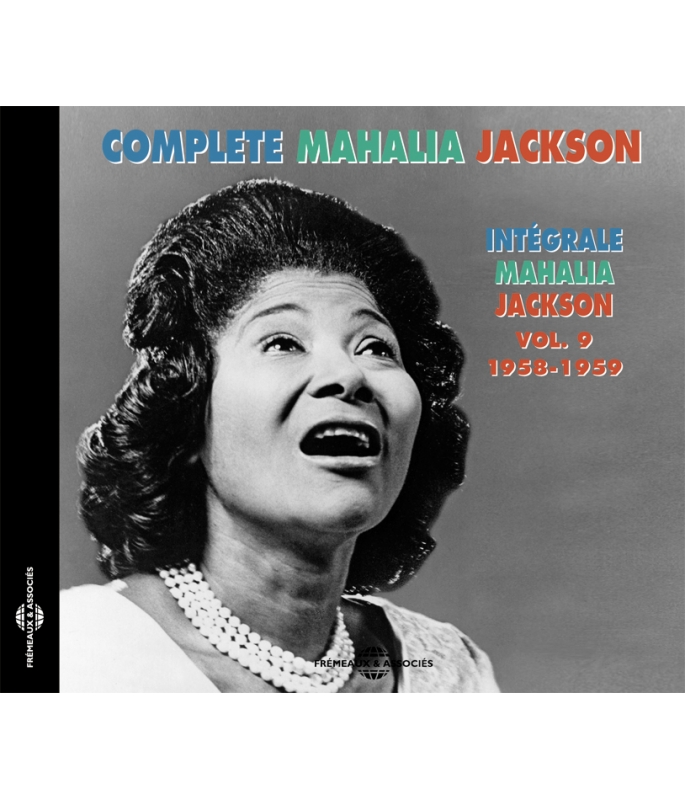
1958 - 1959
Avec sa bouleversante interprétation de Trouble of the World dans le film “Mirage de la vie“, Mahalia Jackson réussit à toucher au coeur et rassembler Noirs et Blancs dans une même prière.
Jean Buzelin
With her deeply moving interpretation of Trouble of the World in the film “Imitation of Life“, Mahalia Jackson succeded in reaching the heart and bringing Blacks and Whites in the same prayer.
Jean Buzelin
Droits : DP - Frémeaux & Associés
-
PisteTitreArtiste principalAuteurDuréeEnregistré en
-
1Don't Move The MountainMahalia Jackson - Intégrale Vol.9, 1958-195900:03:071958
-
2The Lord Has Been A ShelterMahalia Jackson - Intégrale Vol.9, 1958-195900:02:371958
-
3He's Got The Whole World In His HandsMahalia Jackson - Intégrale Vol.9, 1958-195900:01:561958
-
4Have You Any RiversMahalia Jackson - Intégrale Vol.9, 1958-195900:03:241958
-
5For My Good FortuneMahalia Jackson - Intégrale Vol.9, 1958-195900:01:511958
-
6Trouble Of The WorldMahalia Jackson - Intégrale Vol.9, 1958-195900:02:271958
-
7Elijah RockMahalia Jackson - Intégrale Vol.9, 1958-195900:03:011958
-
8Hold Me, Please Don't Let Me GoMahalia Jackson - Intégrale Vol.9, 1958-195900:02:331958
-
9Just To Behold His FaceMahalia Jackson - Intégrale Vol.9, 1958-195900:05:001959
-
10To Me It's WonderfullMahalia Jackson - Intégrale Vol.9, 1958-195900:03:011959
-
11Tell The World About ThisMahalia Jackson - Intégrale Vol.9, 1958-195900:02:281959
-
12Great Getting Up MorningMahalia Jackson - Intégrale Vol.9, 1958-195900:03:501959
-
13When I've Done My BestMahalia Jackson - Intégrale Vol.9, 1958-195900:03:461959
-
14HisMahalia Jackson - Intégrale Vol.9, 1958-195900:03:181959
-
15I Found The AnswerMahalia Jackson - Intégrale Vol.9, 1958-195900:04:231959
-
16How Great Thou ArtMahalia Jackson - Intégrale Vol.9, 1958-195900:03:551959
-
17God Put A Rainbow In The SkyMahalia Jackson - Intégrale Vol.9, 1958-195900:03:121959
INTÉGRALE MAHALIA JACKSON VOL. 9
INTÉGRALE MAHALIA JACKSON VOL. 9
1958-1959
Notre nouveau chapitre de l’histoire de l’œuvre enregistrée de Mahalia Jackson commence par un petit retour en arrière. Nous sommes en effet le lendemain de la seconde journée consacrée à compléter l’enregistrement de la suite “Black, Brown and Beige” de Duke Ellington (1). La chanteuse retourne dans le même studio de Los Angeles et met en boîte deux morceaux, uniquement accompagnée par un organiste et un chœur : Sweet Jesus, malheureusement resté inédit, et (Lord) Don’t Move the Mountain. Ils ont été composés par Doris Mae Akers à laquelle Mahalia a donné un coup de main (1). Peut-être son amie était-elle présente au studio ce jour-là ? Peut-être que ces deux thèmes ont été écrit le jour même ? Nous n’en connaissons pas de versions antérieures et Doris Akers ne les reprendra à son compte qu’au milieu des années 60. Après un passage à Kansas City où elle donne deux concerts au profit d’un hôpital noir, et un crochet vers le sud pour rendre visite à sa famille à la Nouvelle-Orléans, Mahalia rentre chez elle à Chicago. Le 10 mars, elle enregistre (au moins) un morceau, et non des moindres, le negro spiritual He’s Got the Whole World in His Hands qu’elle chantera quelques mois plus tard à Newport (1) et que Tony Heilbut considère comme l’une de ses interprétations les plus inspirées et “abandonnées”. Cette pièce est couplée, sur un 45 tours, avec son Didn’t It Rain provenant de sa première séance Columbia de novembre 1954, et qui n’avait été publié que sur son premier 33 tours “The World’s Greatest Gospel Singer” (2). C’est peut-être autour de cette date que se glisse le mystérieux The Lord Has Been a Shelter qui figure sur le même album que Don’t Move the Mountain et d’autres pièces réalisées entre 1954 et 1957. Arrive le mémorable concert du Newport Jazz Festival et la séance du 10 août où plusieurs titres sont refaits en studio et montés sur le 33 tours original que nous avons réédité dans notre précédent volume (1). Mais entre-temps, deux jours après Newport, Mahalia avait enregistré deux autres morceaux qui seront à leur tour couplés sur un single. La reconnaissance par les amateurs de jazz et la diffusion de ses albums auprès du grand public majoritairement blanc et international ne doivent pas faire oublier que Mahalia Jackson conserve une forte popularité auprès de ses frères de couleur. D’où la publication régulière de 45 tours qui leur sont plus particulièrement destinés. Témoin ces deux nouveaux morceaux, Have You Any Rivers (= God Specializes) et For My Good Fortune (créé par Pat Boone), fortement rythmés et teintés d’une coloration rhythm and blues que savent mettre en valeur les excellents jazzmen de studio qui sont chargés de l’accompagner.
Parmi les diverses activités et apparitions médiatiques de la chanteuse, sa participation au film de Douglas Sirk, “Imitation of Life” (“Le Mirage de la vie”) reste un moment marquant de sa carrière. Des millions de spectateurs (américains et du monde entier) seront frappés et souvent bouleversés par son interprétation de Trouble of the World (3) qu’elle chante à la fin du film pour les funérailles d’Annie (Juanita Moore), la servante noire, dans l’église baptiste d’Hollywood. Le film sortira sur les écrans au printemps de l’année suivante. En décembre 1958, elle enregistre deux nouveaux morceaux, dont le traditionnel Elijah Rock qu’elle inclura désormais dans son programme de concerts. Toutes ces excellentes interprétations éditées en 45 tours en direction de la communauté noire ne seront, pour la plupart, ni reprises en albums, ni rééditées depuis leur parution originale. Ce qui en fait leur rareté. Malgré tout, ce sont quand même les albums 33 tours 30 cm qui bénéficient du maximum d’attention, car ils sont destinés au marché mondial et Mahalia Jackson est devenue l’une des artistes phares de la compagnie Columbia, tous genres confondus. La chanteuse entretient d’excellentes relations avec son nouveau directeur artistique, Irving Townsend, celui qui a eu l’idée de génie de la faire enregistrer avec Duke Ellington. Il est devenu un ami, presque un confident, et prépare longuement à l’avance la composition et la réalisation d’un album. “ Ça n’a jamais été facile de l’enregistrer, disait-il à Laurraine Goreau. Elle travaille dur et, en général, est assez coopérative. Nous divisons les albums en trois ou quatre sessions, et celles-ci ne durent pas plus de deux ou trois heures”. Les répétitions de chansons nouvelles se font avec Mildred Falls, sa fidèle accompagnatrice depuis 1947, peut-être la seule à comprendre et à anticiper les changements de moods et de rythmes, comme le pense Tony Heilbut. L’occasion de donner un coup de projecteur sur cette femme de l’ombre à laquelle Jules Schwerin a consacré un chapitre dans son ouvrage sur Mahalia. Voici ce qu’il dit en substance et en résumé :
Aucun des pianistes enregistrés, aussi talentueux soient-ils, n’a pu se hisser au niveau de l’exceptionnelle Mildred Falls. Elle est en grande partie responsable de la “couleur“ des chants — des disques — de Mahalia Jackson. Accords de blues, triolets, 4-4, bounce (rebondissements), sa musique a la résonance d’un chœur ou d’une congrégation. Elle adorait Mahalia et était heureuse de jouer régulièrement avec elle. Pourtant, selon Brother John Sellers, Mahalia la payait très mal. La reconnaissance du talent de Mildred Falls a été très tardive. Elle est morte à Chicago, rejetée par la seule personne qui n’aurait jamais dû l’abandonner. Sa contribution unique n’a pas été récompensée à sa juste valeur. Mahalia mit fin à ses services lorsque Mildred se risqua à lui demander une augmentation. Tout le clan Jackson lui tourna le dos ; Brother John trouva cela honteux et sa vieille admiration pour Mahalia en prit un coup. Quand elle passait à la télévision, Mahalia Jackson prenait le chèque et décidait de ce qu’elle allait donner à Mildred. Un temps où Mahalia gagnait de 3000 à 7000 dollars par concert, voire plus — 10 000 ces temps-ci à Atlantic City —, Mildred était payée 200 dollars par semaine, plus 100 dollars pour se nourrir et se loger. Et quand elle osa lui demander 100 dollars de plus, elle fut remerciée… Au milieu des années 60, Mildred Falls, malade, vivait de l’aide sociale chez elle à Chicago. Personne ne l’a aidée. Elle est décédée en 1973, peu après Mahalia, pauvre et abandonnée, sans avoir reçu, semble-t-il, la petite part dont elle aurait été bénéficiaire lors de la succession Mahalia Jackson. Précisément, c’est le chanteur Brother John Sellers qui se trouve sur scène avec son groupe en compagnie de Mahalia le 13 février 1959 à l’Orchestra Hall—Chicago’s Carnegie. Le poète Langston Hughes, qui est venu spécialement de New York pour introduire la chanteuse, a préparé pour l’occasion un texte sur les negro spirituals et les gospel songs. Quelques jours plus tard, Mildred Falls retrouve son piano pour l’enregistrement de deux chansons, dont le Just to Behold His Face de Lucie Campbell ; une chorale et une rythmique jazzy renforcent l’accompagnement. Puis sept autres morceaux, destinés à composer le futur album “Great Getting Up Morning“, sont mis sur bande le 11 mars avec Mildred et une rythmique similaire dont il faut souligner l’à-propos et la souplesse. Le chœur, toujours présent, en fait parfois “un peu trop” dans la manière, comme dans When I’ve Done My Best de Thomas Dorsey. En revanche, I Found the Answer, dépouillée de l’orgue et des chœurs, est une interprétation excellente et rafraîchissante. Notons par ailleurs que l’organiste de ces séances, le Professeur Alfred Miller, est le directeur de l’Angelic Choir of Washington Temple Church (4) qui a mis à son répertoire To Me It’s Wonderful et Tell the World About This que vient d’enregistrer Mahalia. Ce dernier titre sera couplé avec une nouvelle version de Trouble of the World que la chanteuse va enregistrer le mois suivant (5), anticipant la sortie du “Mirage du la vie” (le 30 avril). Ce film sera, en effet, l’un des plus gros succès cinématographiques de l’année 1959, y compris dans le Sud où, pourtant, les rapports blancs-noirs sont toujours grinçants. La prestation de la chanteuse, servie par une rare puissance d’expression et de conviction, fait l’unanimité, comme l’écrit Tony Heilbut : “La performance de Mahalia dans Trouble of the World fut le grand moment d’intensité du film, et son flamboyant “I want to see my mother” provoqua des torrents de larmes dans les cinémas de banlieue”. Voici pour la première fois sur un disque, la copie de cet inoubliable moment.
Jean BUZELIN
Jean Buzelin est l’auteur de Negro Spirituals et Gospel Songs, Chants d’espoir et de liberté (Ed. du Layeur/Notre Histoire, Paris 1998) ; il collabore à la Gospel Discography de Cedric J. Hayes & Robert Laughton (rubriques Mahalia Jackson, Sister Rosetta Tharpe, Golden Gate Quartet, etc.).
Notes :
1. En ce qui concerne la “Black, Brown and Beige”, le festival de Newport, et Doris Akers, voir Complete Mahalia Jackson Vol. 8 (FA 1318).
2. Voir Complete Mahalia Jackson Vol. 5 (FA 1315).
3. Elle a enregistré une première fois ce thème en studio en mars 1966, voir Complete Mahalia Jackson Vol. 7 (FA 1317).
4. À ne pas confondre avec la célèbre Angelic Choir dirigée par le Rev. Lawrence Roberts.
5. Cette troisième version, jamais rééditée, ouvrira notre prochain volume.
Ouvrages consultés :
Laurraine Gorreau : Mahalia (Lion Pub., UK 1976 - 2e édition)
Jules Schwerin : God To Tell It : Mahalia Jackson (Oxford University Press, 1992)
Anthony Heilbut : The Gospel Sound (Limelight Ed., 1992)
Cedric J. Hayes & Robert Laughton : Gospel Discography 1943-1970 (Eyeball Productions Inc., 2007)
Nos remerciements sincères à Friedrich Mülhöcker et à Étienne Peltier, toujours prêts à ouvrir leurs discothèques pour nous en confier quelques pièces rares.
Photos & collections : Gilles Pétard, Sony Music Photos Archives, X (D.R.).
English notes
This new chapter in the story of Mahalia Jackson’s recording career begins with a small step backwards, to the day after the second day spent in completing the recording of Duke Ellington’s suite “Black, Brown and Beige” (1). The singer returned to the same Los Angeles studio to cut two titles, accompanied only by an organist and a choir: Sweet Jesus, sadly never issued, and (Lord) Don’t Move The Mountain. Both were composed by Doris Mae Akers to whom Mahalia had given a helping hand (1). Perhaps her friend was present in the studio that day, perhaps the two songs were written that very day? We know of no other earlier versions and Doris Akers herself didn’t reprise them until the mid-60s. After giving two concerts in Kansas City in aid of a black hospital, and a trip south to visit her family in New Orleans, Mahalia returned home to Chicago. On 10 March she recorded (at least) one track, the Negro spiritual He’s Got The Whole World In His Hands which she would sing a few months later at Newport (1) and that Tony Heilbut considered one of her most inspired and “abandoned” interpretations. This 45 rpm is backed by Didn’t It Rain from her first Columbia session in November 1954 which had only been issued on her first 33 rpm “The World’s Greatest Gospel Singer” (2). Perhaps it was around this date that the mysterious The Lord Has Been A Shelter was cut which appears on the same album as Don’t Move The Mountain and other titles recorded between 1954 and 1957. Then came the memorable Newport Jazz Festival concert and the session from 10 August when several titles were repeated in the studio and issued on the original 33 rpm which we reissued in our preceding volume (1). However, two days after Newport, Mahalia recorded two more titles that were issued as a single. It is worth noting that, although her albums were aimed at a predominantly white and international audience, she remained hugely popular within her own black community. Hence, the regular issues of 45s destined specifically for the latter e.g. two new tracks Have You Any Rivers (= God Specializes) and For My Good Fortune (created by Pat Boone) where a strong beat and rhythm and blues overtones is emphasised by the excellent studio jazzmen who accompanied her.
One of the highlights of her varied career was her appearance in Douglas Sirk’s film “Imitation of Life”. Millions of spectators, both American and worldwide, were moved and often overwhelmed by her interpretation of Trouble Of The World (3) which she sings at the end of the film during the funeral of the black servant Annie (Juanita Moore), in the Hollywood Baptist Church. The film appeared the following year. In December 1958 she recorded two more titles one of them the traditional Elijah Rock which she went on to include in her concert programmes. None of these excellent interpretations, intended for black consumption, were ever reprised on albums nor have they been reissued since their first appearance. This is what makes them so rare. In spite of this it is the 33 rpm albums that gained most attention for they were destined for a world market and Mahalia Jackson became one of Columbia’s leading performers in whatever genre. She got on very well with her new artistic director, Irving Townsend, who had had the brilliant idea of arranging for her to record with Duke Ellington. He became a friend, almost a confidant, and took immense pains with the preparation of an album. He confided to Laurraine Goreau “It was never easy to record her. She works hard and generally is very co-operative. We divide the albums into three or four sessions which never last longer than two or three hours.” New songs were rehearsed with Mildred Falls, her loyal companion since 1947. “Mildred Falls is perhaps the only pianist who completely understands and anticipates Mahalia’s shifting moods and rhythms”, according to Tony Heilbut. Now is the occasion to bring out from the shadows this remarkable woman to whom Jacques Schwerin devoted a chapter in his book on Mahalia. The following is a summary of what he wrote: “Mahalia had employed many gifted pianists and organists to accompany her on record but of all the talented musicians she worked with, none was the equal of Mildred Falls. It was only Mildred who never lost her way in the call-and-response gospel style that Mahalia had made her signature. Without Mildred’s blues chords, her triplets and four-four irresistible, inimitable bounce, her commanding music with its resonance of choir and congregation, Mahalia’s art would have been the poorer. Mildred adored her and cherished their alliance. However, according to Brother John Sellers, Mahalia paid her very badly.
Recognition for Mildred Falls’ talent in her own right is long overdue. She died in Chicago, poor and rejected by the one person who should not have abandoned her. Her unique contribution to Mahalia’s success should have been decently compensated but the opposite became her reality. When Mildred dared to ask for a rise Mahalia sacked her on the spot. The entire Jackson clan turned their backs on her. Brother John found this shameful and, as he grew older, his adoration of Mahalia shrank. When she moved into television, she had the cheque sent directly to her. What Mildred then received was whatever Mahalia wanted to give her. While the latter was earning $3000 to $7000 a night (even $10000 at this time in Atlantic City), Mildred was being paid $200 a week, plus $100 expenses. It was when she asked for another $100 that Mahalia fired her. In the mid-60s, when Mildred Falls was down on her luck, sick and on home relief in Chicago, no-one ever came to her aid. She died in 1973, shortly after Mahalia, apparently without even having received the small legacy due to her from Mahalia’s estate”.
It was, in fact, singer Brother John Sellers and his group who were on stage with Mahalia at a concert on 13 February 1959 at the Orchestra Hall—Chicago’s Carnegie. The poet Langston Hughes came especially from New York to introduce the group with a speech that he had prepared on Negro spirituals and gospel songs. A few days later, Mildred Halls was back on piano for the recording of two songs, including Just To Behold His Face by Lucie Campbell; a choir and a jazzy rhythm section strengthened the backing. Then seven other titles, intended for the future album “Getting Up Morning”, were cut on the 11 March with Mildred and a similar, but even more flexible rhythm section. However, the choir this time occasionally overdoes it, as on Thomas Dorsey’s When I’ve Done My Best. On the other hand, I Found The Answer, stripped of the organ and choirs, is an excellent and fresh interpretation. The organist for these sessions, Professor Alfred Miler, was the leader of the Angelic Choir of Washington Temple Church (4) who had included in its repertoire To Me Its Wonderful and Tell The World About This that Mahalia had just recorded. The latter title would be backed by a new version of Trouble Of The World that she recorded the following month (5), prior to the screening of “Imitation of Life” on 30 April. A film that, in fact, was to be one of the cinema highlights of 1959 – even in the Deep South where white-black relationships were still a touchy subject. Mahalia’s powerful and emotional interpretation was widely acclaimed as Tony Heilbut records “Mahalia’s performance of Trouble of the World was the emotional climax of that film; her flamboyant “I see to my mother” provoked floods of weeping in suburban theatres.” Here for the first time on disc is a copy of that unforgettable moment.
Adapted from the French text of Jean BUZELIN by Joyce WATERHOUSE
Jean Buzelin is the author of Negro Spirituals et Gospel Songs, Chants d’espoir et de liberté (Ed. du Layeur/Notre Histoire, Paris 1998) ; he collaborated on the Gospel Discography by Cedric J. Hayes & Robert Laughton (sections on Mahalia Jackson, Sister Rosetta Tharpe, Golden Gate Quartet etc.).
Notes
1. With regard to “Black, Brown and Beige”, the Newport Jazz Festival, and Doris Akers, see Complete Mahalia Jackson Vol. 8 (FA 1318).
2. See Complete Mahalia Jackson Vol.5 (FA1315).
3. She had recorded this theme for the first time in the studios in March 1956 (see Complete Mahalia Jackson Vol.7 (FA1317).
4. Not to be confused with the famous Angelic Choir led by the Rev. Lawrence Roberts.
5. This third version, never reissued, will open our next volume.
Works consulted :
Laurraine Gorreau: Mahalia (Lion Pub. UK 1976 - 2nd edition).
Jules Schwerin: God To Tell It: Mahalia Jackson (O.U.P., 1992).
Anthony Heilbut: The Gospel Sound (Limelight Ed. 1992).
Cedric J. Hayes & Robert Laughton: Gospel Discography 1943 - 1970 (Eyeball Productions, Inc. 2007).
With sincere thanks to Friedrich Mühlöcker and Etienne Peltier, always ready to provide us with certain rare recordings from their collections;
Photos & collections : Gilles Pétard, Sony Music Photos Archives, X (D.R.).
discographie
CD 1
1. DON’T MOVE THE MOUNTAIN (D.M. Akers - M. Jackson) CO40656
2. THE LORD HAS BEEN A SHELTER (J.W. Alexander - S. Cooke) CO ?
3. HE’S GOT THE WHOLE WORLD IN HIS HANDS (Trad. - adapt. G. Love) CO5782
4. HAVE YOU ANY RIVERS (O.C. Eliason) CO61255
5. FOR MY GOOD FORTUNE (O. Blackwell - B. Stevenson) CO61256
6. TROUBLE OF THE WORLD (Trad.)
7. ELIJAH ROCK (Trad. - arr. J. Hairston) CO61996
8 HOLD ME (PLEASE DON’T LET ME GO) (T.A. Dorsey) CO61997
9. JUST TO BEHOLD HIS FACE (L.E. Campbell) CO62353
10. TO ME IT’S WONDERFUL (R. Goodpasteur) CO62354
11. TELL THE WORLD ABOUT THIS (Trad. - arr. M. Jackson) CO62379
12. GREAT GETTIN’ UP MORNING (Trad. - arr. M. Jackson) CO62380
13. WHEN I’VE DONE MY BEST (T.A. Dorsey) CO62381
14. HIS (L. Williams - Arquilla) CO62382
15. I FOUND THE ANSWER (J. Lange) CO62383
16. HOW GREAT THOU ART (S.K. Hine) CO62384
17. GOD PUT A RAINBOW IN THE SKY (A. Jenkins) CO62385
Mahalia Jackson (vocal) with :
(1) Unknown (organ)(vocal choir). Los Angeles, 13/02/1958.
(2) Unknown (piano)(organ)(guitar)(bass)(drums)(vocal choir). Unknown date, poss. same as for 3.
(3) Unknown (organ)(guitar)(bass)(drums)(hand clapping). Chicago, 10/03/1958.
(4-5) Robert G. Banks (piano), Lilton Mitchell, Bert Keyes (organ), Wallace “Wally“ Richardson (guitar), Doles Dickens (bass), David “Panama“ Francis (drums), unknown (vocal choir)(hand clapping on 5). New York City, 10/07/1958.
(6) Unknown (piano intro)(organ). Film “ Imitation of Life ”. Hollywood, Summer 1958.
(7-8) Unknown (piano)(bass)(drums)(vocal choir). NYC, 26/12/1958.
(9-10) Mildred Falls (piano), Alfred Miller, Harold Smith? (organ), John Simmons (bass), Ed Thigpen (drums) unknown (vocal choir). NYC, 25/02/1959.
(10-17) Mildred Falls (piano), Alfred Miller (organ, except on 15), Jimmy Raney (guitar), Addison Farmer (bass), Osie Johnson (drums, prob. chimes on 16), unknown (vocal choir, except on 14, 15). NYC, 11/03/1959.
CD COMPLETE MAHALIA JACKSON INTÉGRALE MAHALIA JACKSON VOL. 9 1958-1959 © Frémeaux & Associés (frémeaux, frémaux, frémau, frémaud, frémault, frémo, frémont, fermeaux, fremeaux, fremaux, fremau, fremaud, fremault, fremo, fremont, CD audio, 78 tours, disques anciens, CD à acheter, écouter des vieux enregistrements, albums, rééditions, anthologies ou intégrales sont disponibles sous forme de CD et par téléchargement.)
